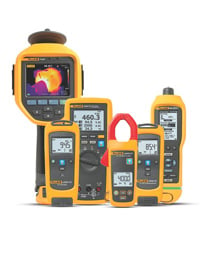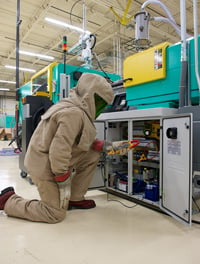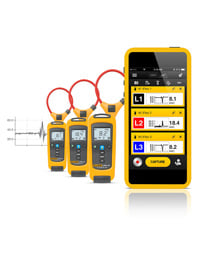It must be something in the air.
When we asked Fluke users for their thoughts on wireless test tools, they came back with our biggest survey response yet: 137 technicians from eight nations weighed in. That's at least double our typical response.
Bottom line: regardless of whether they're using wireless test tools now, most see wireless testing as both more convenient and, in many situations, far safer than traditional methods. As Jeff, an in-house electrician and Fluke CNX wireless system user, said, "It makes doing pm and troubleshooting so much safer and easier. The way things are going it will only get better."

Of those answering our survey 114 (83 percent) work in the USA, while another 17 (12 percent) operate in Canada. We also heard from technicians in Brazil, Egypt, Finland, India, Japan, and South Africa.
Some 31 percent of respondents (43) work in industrial facilities, while 18 percent (24 techs) work as contract service providers, and 9 percent (13 people) support commercial facilities. Other represented industries were government (12 respondents), utilities (7 respondents), data centers (5 respondents). Three techs weighed in from hospitals and three from telecom operations.
Many occupations, many perspectives
What jobs do they hold? You name it, these guys do it. Best represented: maintenance technicians (24 percent or 33 respondents), followed by in-house electrician (15 percent/21 respondents) and electrical contractors (12 percent/17 respondents). We also heard from 12 HVAC/R technicians, eight maintenance managers and six R&D technicians, as well as process techs, facilities managers, and 25 participants who weighed in as "other," including an auto technician, biomedical engineer, elevator service technician, and biomedical equipment tech.
Since wireless test tools have only been available for a few years, it's understandable that only about a third of respondents (35 percent/48 respondents) report that they're using wireless tools today. Of these, seven are using Fluke CNX™ wireless devices, eight rely on the more recent Fluke Connect® wireless system, and 33 use "individual tools," including wireless infrared cameras, digital multimeters (DMMs), wireless automotive onboard diagnostic readers, air speed and temperature readers for HVAC/R applications, radio frequency spectrum testers, and more.
"I think it will increase accuracy of point-in-time electrical inspections and allow safer access to specific electrical events"
Why not wireless?
Why aren't more using wireless? For some 60 respondents it boils down to one nasty six-letter word: BUDGET. "My employer has not provided them to me," said Chris, an American electrical contractor. "From what I have seen and read about them I think that it's a fantastic idea for safety as well as other things." Clifford, an elevator service technician in Canada, had a similar response: "Haven't been issued them."
For others, wireless tools are not yet part of the program for a variety of reasons.
"We haven't looked into wireless test tools yet," said Eric, a US maintenance technician. Ted, a facility manager, said wireless tools are "relatively new, just learned of their availability. Our techs are equipped and until they need new equipment, the added cost is not feasible." Wayne, a thermography consultant, said "current equipment does not integrate wireless." For Jeff, a trade school instructor in oil and gas process instrumentation and control, it's a question of working the new wireless tools into the curriculum. "Still working on building the wireless portion of the program," he said, "and need to obtain wireless instrumentation and test equipment." But looking ahead, he predicted that wireless tools "will have a significant impact." Vincent, an electrical contractor, said "I don't know much about them and am in the process of learning." And he added, "I believe it will make testing and troubleshooting much easier."
Great expectations
Some non-users like Richard, in-house electrician for a government agency, don't expect to use wireless tools. "Why should I?" he asked, "I can't foresee using them." But many see the benefits, even if they're somewhere in the future.
"In some jobs using wireless meters would make things much simpler," said Allen, a maintenance tech for an American utility. "The ability to put the main part of the meter in one location and take the display with you to another location while you make adjustments to the process would be helpful."
"Being able to watch a meter while starting or testing in a different room would cut down on having two people test equipment," said James, a maintenance tech for a cold storage warehouse. Charles, a final test engineering technician, had a similar view. "Many times signals need to be adjusted, calibrated, and it is difficult to see the screen or DVM," he observed. "With a wireless meter you can get to the adjustment point even though the meter is on the other side of the machine."
Beyond the convenience factor non-users anticipate is the question of safety. "I think that wireless tools are the way of the future," said Kyle, an industrial process technician. "They enhance safety by allowing the technician to connect the equipment, vacate the immediate threat area, and take the measurements needed." Mike, a thermography consultant, shared a similar thought: "I think it will increase accuracy of point-in-time electrical inspections and allow safer access to specific electrical events."
Views from users

For non-users, these are hopes and dreams. For current users of wireless test tools, these benefits are part of the job.
"I take readings in motor control centers and switchgear, also automatic transfer switches," said Jeff, an i n-house electrician and Fluke CNX user. "I take all types of readings that can now be done without being in the line of fire. I can do most of my pm checks without having to put on arc flash gear. They are a great time-saver. And the best thing is that you can do your work and be out of danger with your test equipment."
Safety was also a key issue for Jerry, an in-house industrial electrician. "To be able to monitor current and voltage in a live power box with it closed - it is a great tool to have. Putting a meter that is wireless on equipment or a power panel while it's turned OFF is a safe thing to be able to do on my job - and have the cover closed when the power is turned on."
When arc flash hazards are present, safety and convenience go hand in hand. "I think wireless will be used much more," said Corey, an industrial service engineer and Fluke Connect user who programs, installs, commissions, and upgrades servo driven test benches. "You can install your meter inside an electrical cabinet, have the display outside, and still be able to get live readings, without the use of so much arc flash equipment and the associated paperwork that goes with it."

Other users focused on the gains possible in integrating multiple kinds of test data wirelessly onto a computer or smart phone, creating a kind of miniature "Internet of Things" (IoT). Myles, an automotive electronics consultant, uses diagnostic scan tools, a wireless camera for video transmission, wireless capture of onboard diagnostics data to merge with real-time video, wireless capture of live CAN bus data, and more. He predicts that wireless "will make setup faster/easier, will allow wireless control of devices such as scopes/meters, will allow simultaneous video and data capture, will allow simultaneous capture of analog and digital data, and more."
No solution is perfect, of course. According to Steve, an industrial maintenance technician and Fluke CNX user, "I sometimes get it out of storage and need to put batteries in it, even though it was off."
Finally, for one respondent, wireless testers are almost too much of a good thing. Jonathan, who uses Fluke CNX devices in his work as in-house electrician in Canada, explained, "Wireless test tools will be huge in the future and make testing/tracing and multi-reading a breeze. Saves time, and my legs, lol! Love the set! Works awesome. Only problem is trying to keep it in one place - coworkers keep using my gear 'cause it's better."